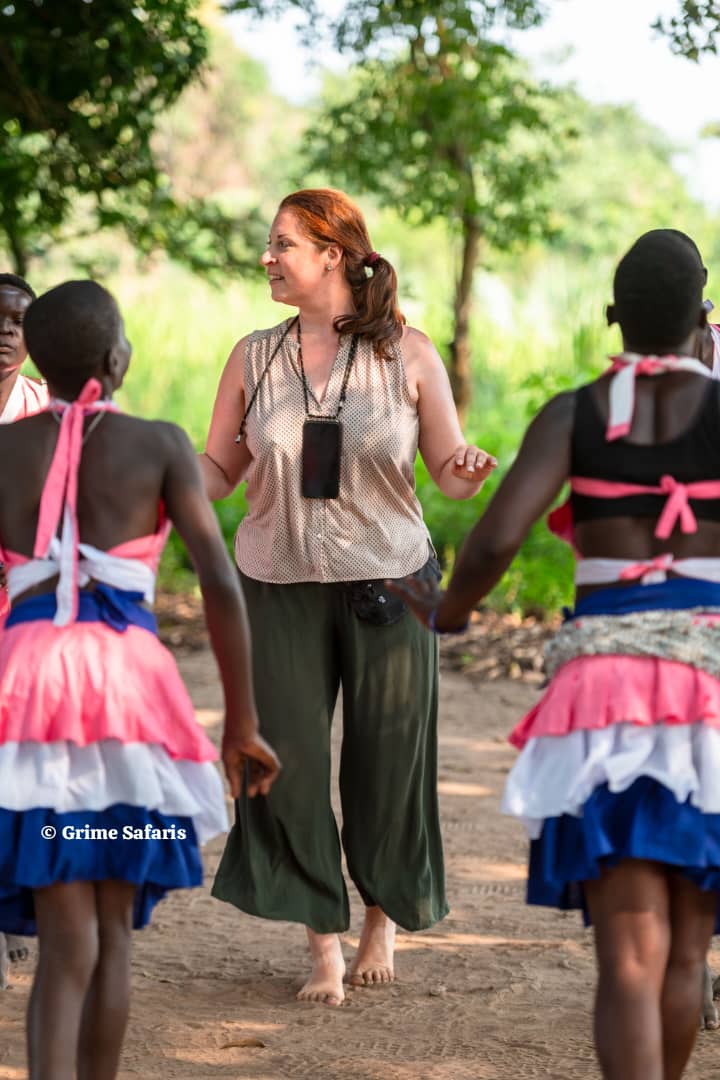Acholi Traditional Dancers hire with Grime Safaris in Gulu City
Experience the unique culture of the Acholi people with our authentic Acholi Traditional Dancers available for hire near Gulu City. At Grime Safaris Gulu, we bring you closer to the rich heritage and lively spirit of Northern Uganda through captivating dance performances that showcase the unique traditions of the Acholi community.
About Acholi Traditional Dances in Gulu:
The Acholi people are renowned for their energetic and expressive dances, which play a vital role in their social and cultural life. These Acholi dances are performed during various ceremonies such as weddings, festivals, and community gatherings, often accompanied by traditional instruments like the adungu (a stringed instrument), Bul, Awal, Oluru, Rigi rigi, and Bila.
Bwola Dance
Bwola Dance – Acholi Royal Dance
Bwola Dance is performed in Acholi royal events like crowing of new Acholi Chiefs, welcoming Acholi Chiefs in events. Present day, Acholi Bwola Dance is also performed in major events, celebrations, marriage events, church functions e.t.c
Bwola Dance is also performed in leisure events, Schools as part of the co-curricular activities e.t.c.
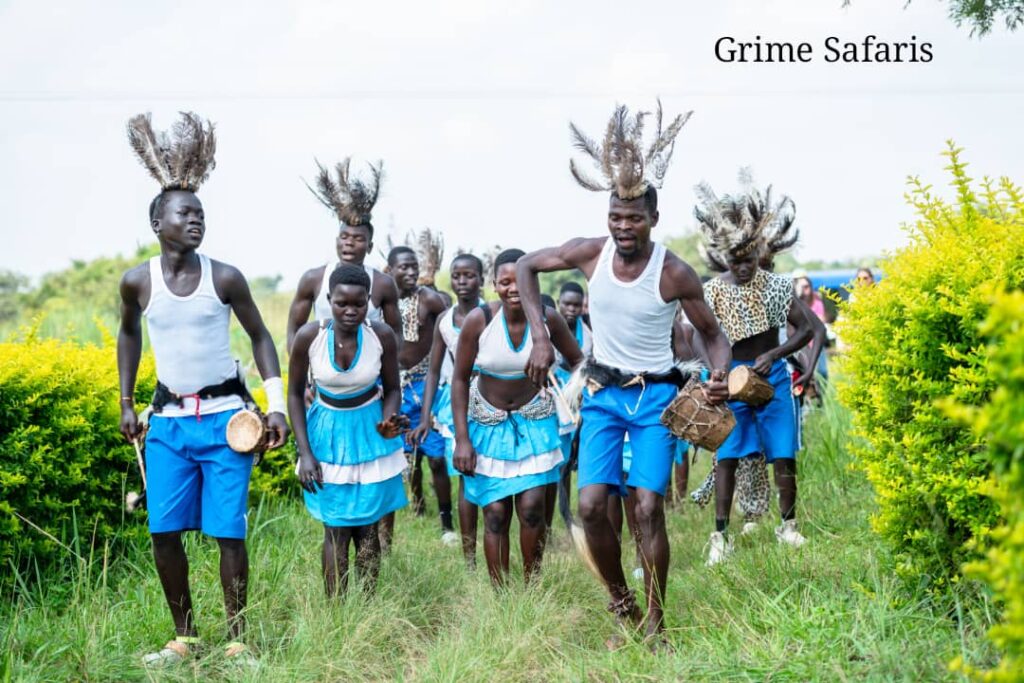
Otole Dance
Otole – War Dance
Performed initially by the Acholi People during war and after war to courage amongst Acholi warriors in event of preparation for war and celebration after wining a war against their enemies/rivals
Today Otole Dance is still being performed in Acholi events, celebrations, leisure times e.t.c
Orak/Larakraka Dance
Larakaraka – Courtship Dance
Larakaraka/Orak is one of the Acholi Courtship dances performed during leisure time by the Acholi people back in the day, present day we still have some communities that do perform it in the evening time (Leisure time) although mostly commercialized groups for profit interest.
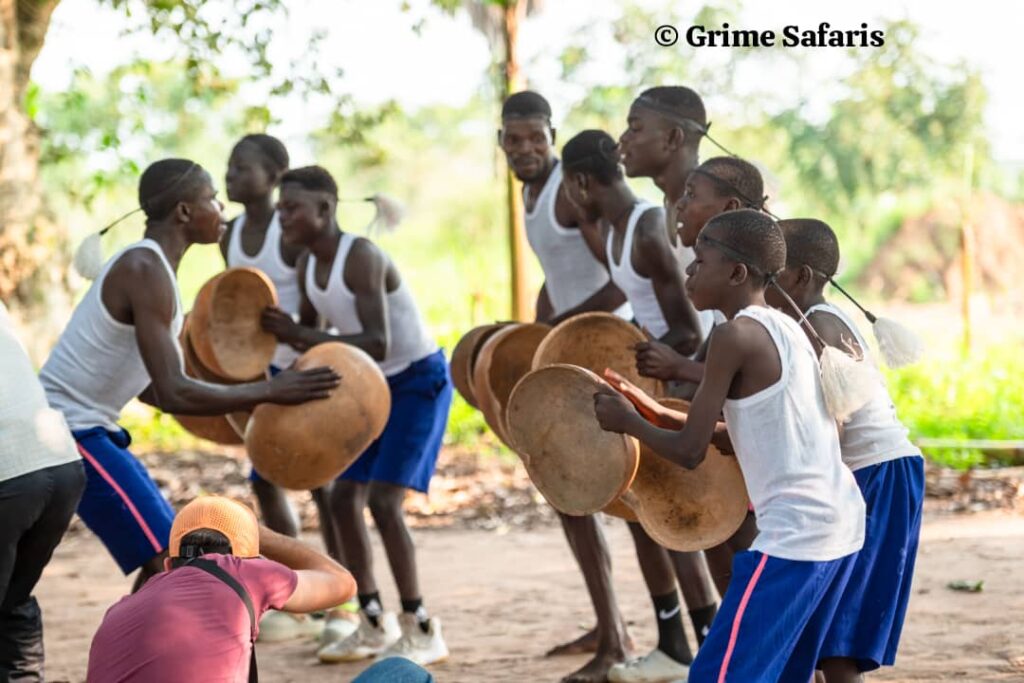
Larakaraka Dance was a moment to spot a perfect marriage partner amongst the Acholi youth (Young adults), every male dancer was to show the best talents/skills in dancing to impress a female dancer to choose him for marriage.
Lakubukubu Dance
Lakubukubu Dance is an acholi dance Acholi people perform for leisure or during free time to show happiness, joy, pride in their culture, beauty, creativity, fitness and celebration.
Acholi young girls and boys are the ones that commonly perform the famous Acholi dance - Lakubukubu Dance.
During Acholi Tours with Grime Safaris, we can arrange for you dancers who can entertain you with this amazing Acholi Dance while in Uganda.
Present day Lakubukubu dance is also highly performed in luo events, Acholi Weddings and Acholi Traditional Marriages.
Apitti Dance - Acholi Courtship dance
The Apitti dance, also known as myel Apiti, is a traditional courtship dance of the Acholi people of northern Uganda. It is performed by women and is a vibrant expression of Acholi culture. Grime Safaris can arrange for Apitti dance performed in Gulu City or any part of northern Uganda.
Ajere Dance - Acholi Courtship dance
The Ajere Dance is a traditional courtship and flirtation dance of the Acholi people, who live in Northern Uganda and South Sudan. The Acholi Apitti dance is performed by young, unmarried men and women to find a potential partner.
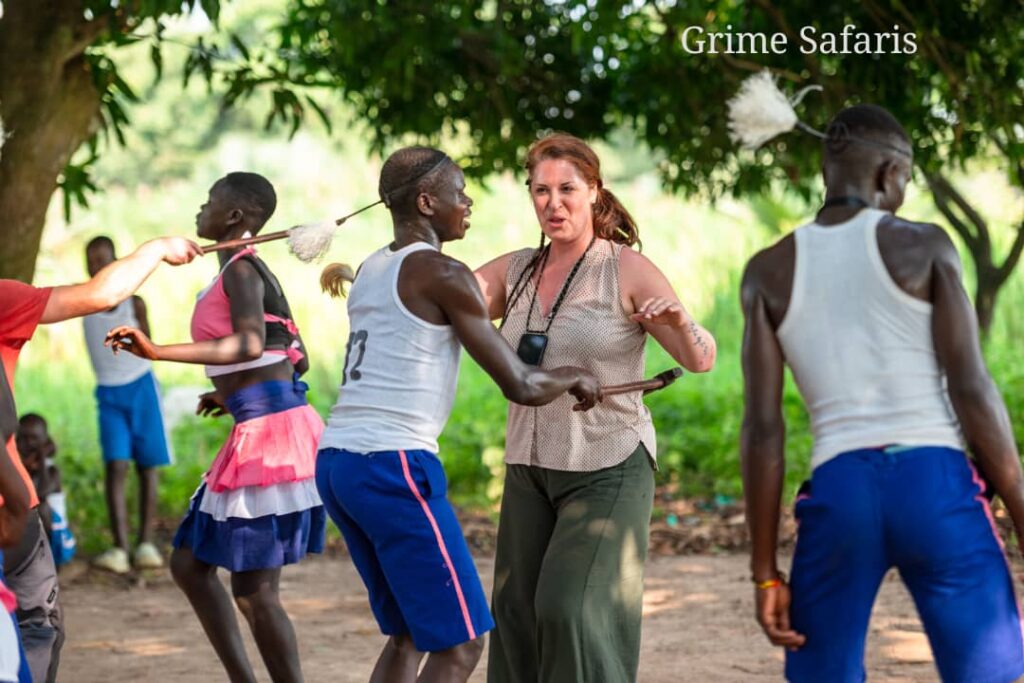
Key characteristics of the Ajere Dance:
- Purpose of Ajere Dance: Ajere dance is a form of flirtation where young Acholi people demonstrate their interest in potential partners.
- Participants in Ajere Dance: It is performed by the youth who are of marriageable age, showcasing their coming of age.
- Ajere Dance Performance: The Ajere dance is typically a casual, joyful affair, full of playful moves and energy, reflecting its role in courtship.
- Cultural significance: of Ajere Dance While the Acholi people have a wide variety of traditional dances, the Ajere is one of the more subtle courtship dances, focused specifically on the interactions between young men and women.
Konge Dance - Acholi Courtship dance
Konge dance is one of Acholi traditional dances that is not very famous and it is young boys dance.
Dingi Dingi Dance - Young girls dance
The Dingi Dingi is a traditional children's dance performed by the Acholi people of northern Uganda. The name "dingi dingi" is an onomatopoeia derived from the sound of the small drums that provide the rhythm. The vigorous, complex movements in Dingi Dingi dance were originally used to assess the physical well-being of young girls, and the dance is now performed at weddings and other celebrations.
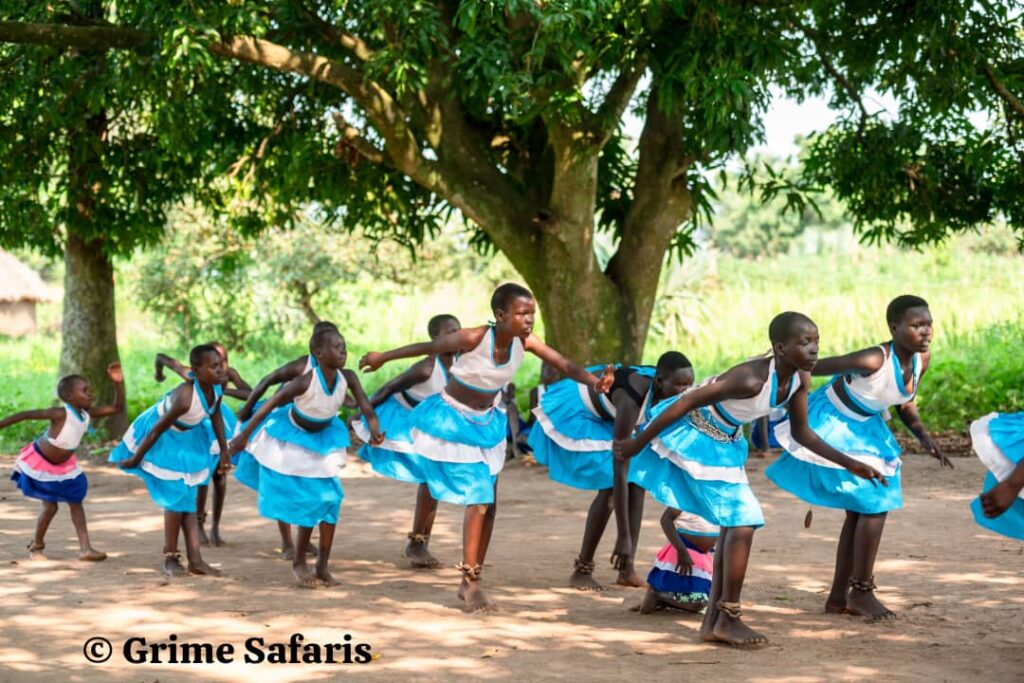
Dingi Dingi Performance
- Dancers: Traditionally Dingi Dingi dance is performed by unmarried girls under 15, though it is now often performed by girls above 15 years. A captain or lead dancer guides the group.
- Movement: Dingi Dingi Dancers form lines and circles, twisting their waists, hips, and chests to the rhythm. The movements in Dingi Dingi dance are said to imitate the motions of animals like antelopes and the graceful crested crane, combined with playful, soldier-like moves.
- Instruments: A musical group of boys accompanies the dancers with a rhythmic beat produced by:
- Two small drums
- One large drum
- Calabashes
- A flute
Significance of Dingi Dingi Dance
- Cultural identity: Dingi Dingi dance is a point of cultural pride and a means of passing on traditions to younger generations.
- Social purpose:
- Child development: Dingi Dingi originated from games played by young girls and was a way for elders to gauge their children's strength and physical fitness.
- Celebration: Today, Dingi Dingi dance is a staple at "merrymaking" functions such as weddings, introductions, and initiation ceremonies.
Myel Agulu - Acholi Pot Dance
The Acholi Pot dance involves performers skillfully balancing clay pots on their heads while executing rhythmic steps and coordinated movements to the beat of indigenous drums and music. The Pot Dance showcases agility, grace, and the rich artistic expression of the Acholi people while appreciating artisans that make such beautiful pots.
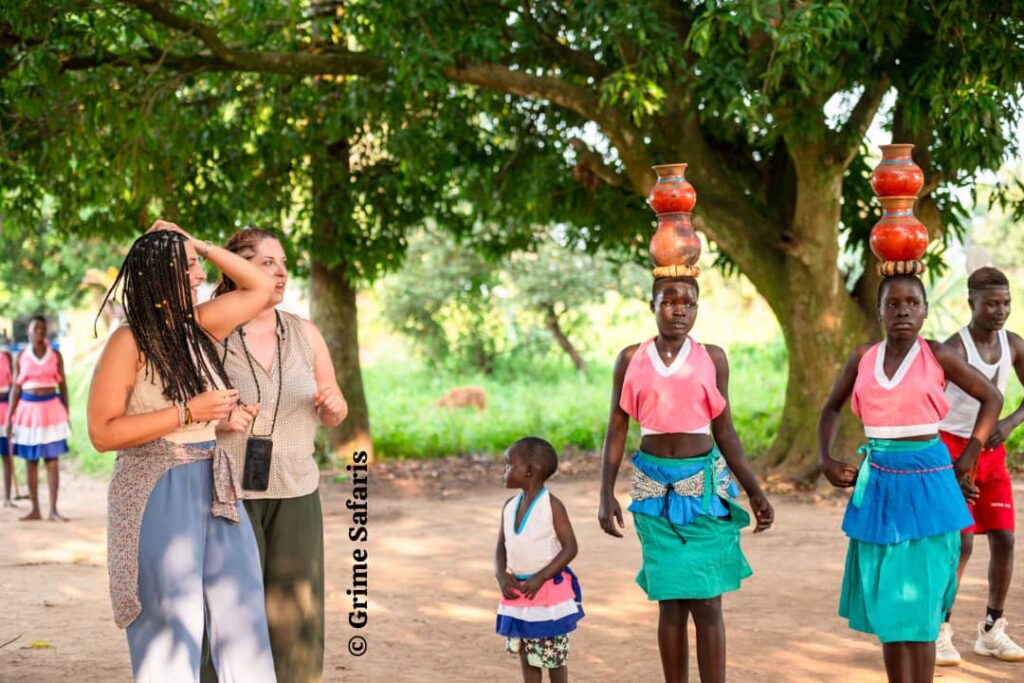
Costumes typically feature colorful traditional attire adorned with beads and accessories, enhancing the visual appeal of the performance.
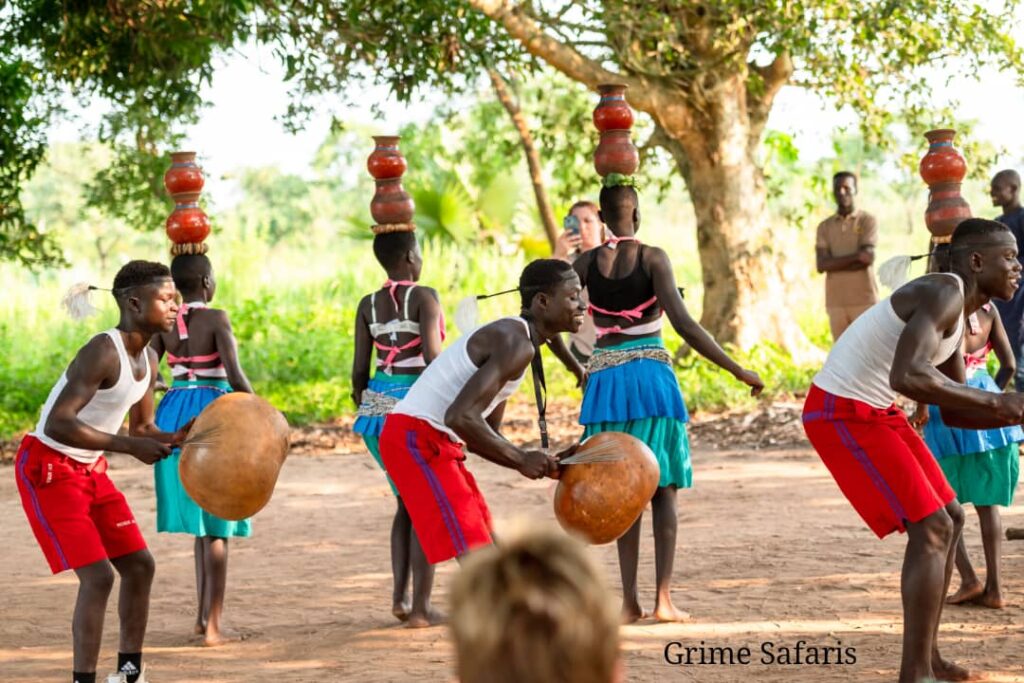
The pot dance not only entertains but also serves as a medium for storytelling, passing down folklore, and reinforcing cultural identity within the community.
To hire Acholi Traditional dancers in Gulu City, Grime Safaris can help yiu very fast after booking in advance. For More information; Call/WhatsApp:+256 774368857 Email: grimesafaris@gmail.com Website: www.grimesafaris.com

